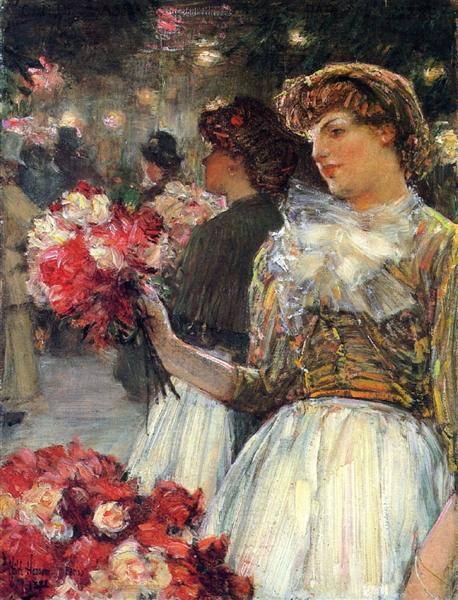תיאור
היצירה "Peoniaes" של צ'ילדה חסאם, שצוירה בשנת 1888, היא חלק מתקופת מפתח בקריירה של האמן, שם חקר הצבע והאור הופך לציר המרכזי של ייצורו. חסאם, אקספקטנט יוצא מן הכלל של האימפרסיוניזם האמריקני, חוויות בציור זה עם ייצוג הטבע במצבו השופע והתוסס ביותר, ומתמקד ביופיים של פרחים. הבד מראה זר מפואר של אדמוניות, ויוצר תחושה של רעננות וחיוניות המקיפה את הצופה בחיבוק חזותי.
ההרכב מתמקד בקבוצת אדמוניות, המסודרת בפרופיל א -סימטרי מעט השומר על תשומת הלב של הצופה. הפרח, עם שכבות עלי כותרת בשפע של עלי כותרת, בולט בעושר ועומק צבעיו: גוונים מגוונים של ורוד ואדום, שזורים זה בזה בניואנסים של לבן וצהוב, מעבירים תחושת תנועה וחיים. נראה שהאור מחלחל דרך הפרחים, מאיר את קווי המתאר שלו ומציע את העדינות המהותית של כל עלי כותרת. דרך מכת מברשת רופפת ונוזלית, חסאם לוכד את המהות הארעית של הפרחים הללו, ומעורר את מעבר הזמן ואת שבריריות הטבע.
השימוש בצבעים הוא אחד ההישגים המשמעותיים ביותר של עבודה זו. חסם מיישם את טכניקת האימראסט שלה, שיטה המורכבת ממייחת צבע עבה, הוספת מרקם וממד על פרחים. כל מגע מברשת הופך לחגיגה של אור וצל, ויוצר אפקט כמעט שלושה ממדי שמושך את מבטו של הצופה לעבר העבודה. לוח הצבעים התוסס המשמש את האמן מגיב לרצון לחבר רגשות אנושיים עם העולם הטבעי, מאפיין ייחודי של האימפרסיוניזם.
אין דמויות אנושיות ב"פוניה "; עם זאת, הפרחים עצמם מתעוררים לחיים ולאישיות באמצעות ייצוג מחוות וצבעים עזים. במובן זה ניתן להרהר ביצירה כדיוקן של הטבע, שם אדמוניות הופכות לגיבורים בפני עצמם. גישה זו חושפת קשר עמוק בחסאם עם הפלורה האמריקאית, ומשקפת תנועה אמנותית שהחלה להעריך את היומיום ואת הטבעי, בניגוד לנושאים ההיסטוריים והמיתולוגיים שהיו שולטים בתקופות קודמות.
צ'ילדה חסאם, חלוץ במעגל האימפרסיוניסטי, קשור לרוב ליצירות עכשוויות אחרות המראות פרחים, כמו ציורי פייר-אוגוסט רנואר או קלוד מונה, שגם הם מצאו השראה ביופיו של העולם הטבעי. עם זאת, חסאם משיג סגנון ייחודי המשלב את החזון האישי שלו עם טכניקות חדשניות, וכתוצאה מכך שפה חזותית טרייה. יצירתו לא רק כתוב בהקשר אמנותי, אלא גם משקפת את פריחת התרבות האמריקאית בסוף המאה ה -19, בין הערצה הולכת וגוברת לאימפרסיוניזם אירופי.
"Peonia" מזמין את הצופה לעצור ולהרהר ביופי שלעתים קרובות אנו מתעלמים מהם בחיי היומיום שלנו. היצירה אינה רק ייצוג של פרחים; זוהי חגיגה של הרגע הנוכחי, הזמנה להעריך את הפאר הטבע הסובב אותנו. בעידן בו החלה התפתחות תעשייתית לשלוט, חסאם מזכיר לנו את החשיבות של רגעים חולפים ויופי מהותי של הפשוטים, ומכסה את מהות האימפרסיוניזם בביטוי חזותי מהדהד עמוק.
KUADROS ©, צבע מפורסם על הקיר שלך.
ציורי שמן בעבודת יד, עם איכות אמנים מקצועיים וחותם ייחודי של KUADROS ©.
שירות רבייה בתמונות עם ערבות שביעות רצון. אם אינך מרוצה לחלוטין מהעתק הציור שלך, אנו מחזירים את הכסף שלך 100%.

